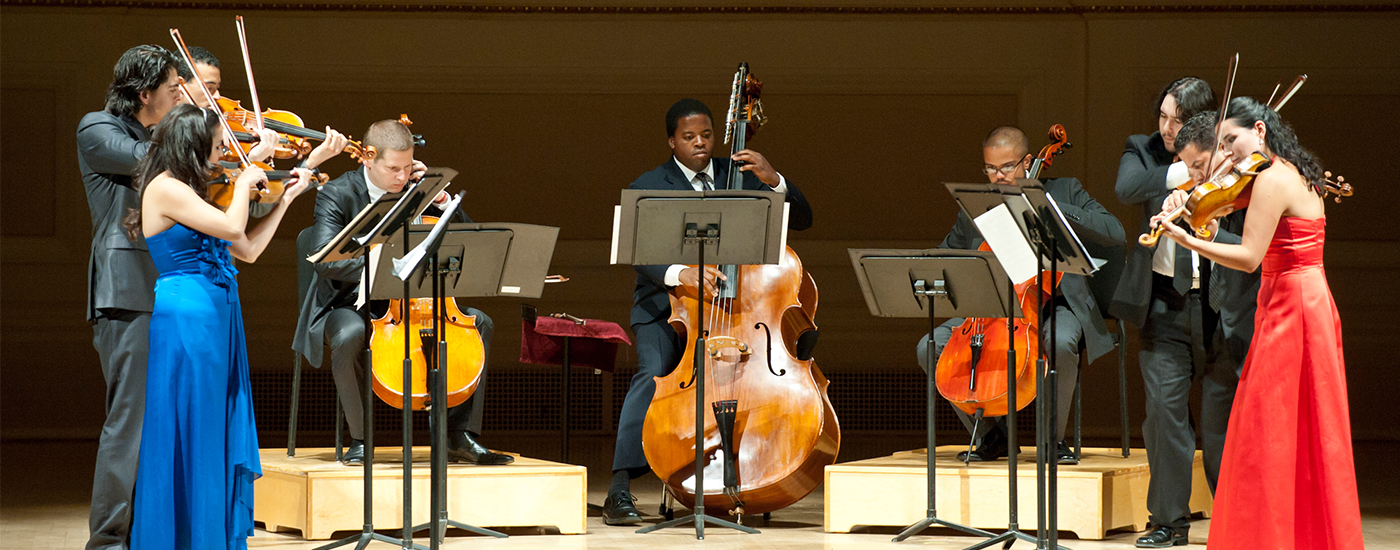In the mid-1990s, violinist Afa Sadykhly Dworkin, then an undergraduate at the University of Michigan, was asked to arrange a concert showcasing musicians from underrepresented minority groups. When she saw the depth of undiscovered talent, she had one question: “Why are they underrepresented?”
Dworkin is now the president and artistic director of Sphinx, a nationally recognized nonprofit that aims to overcome cultural stereotypes in classical music, and to encourage the participation of black and Latino musicians. Sphinx was founded in 1996 by Dworkin’s husband, Aaron Dworkin, a 2005 MacArthur Fellow and a former member of the Obama National Arts Policy Committee.
The Sphinx Virtuosi ensemble will hold a two-day residency this week in Syracuse, hosted by the Redhouse Arts Center, the Janklow Arts Leadership program at Syracuse University, and the graduate program in arts administration at Le Moyne College. The visit will include a panel discussion on “Diversity in the Arts” and six daytime mini-concerts at area elementary schools. The residency culminates in a free concert featuring the ensemble at Fowler High School, 227 Magnolia St., on Friday, Oct. 16, 7:30 p.m.
Sphinx recognizes that in struggling Rust Belt cities like Detroit and Syracuse, opportunities for young people of color to participate in the arts are often limited — especially if they live in high poverty areas. With Syracuse’s embarrassing designation as the city with the nation’s highest rate of concentrated poverty among black and Hispanic communities, it is clearer than ever that in many parts of the city, there are too many people struggling to meet basic daily needs — let alone finding opportunities to experience the arts.
Dworkin said the arts are no replacement for basic life necessities. “I don’t want to say that it could solve it,” she said. “But it could be an instrumental force.
In her year-round work in the Detroit public schools, Dworkin said she sees how the arts can make a profound impact on the quality of life for young people. “They run to their after-school violin group class as a place of refuge and a place where they can feel confident, where they can have fun and have a break from their everyday challenges,” she said.
In the Syracuse City School District, about 10 percent of students in kindergarten through eighth grade play instruments, and about 65 percent participate in choral ensembles. In high school, students generally choose one or the other, or participate in art classes. Some do both.
Sarah Gentile, supervisor of fine arts, said that the district sometimes has trouble finding enough instruments for all students who want to play. “We’ve been working really hard to expand our program so that we can include as many students as possible,” Gentile said. “I would love to be able to put an instrument in every child’s hand that wants it, but sometimes we can’t.” In Detroit, Sphinx provides violins and lessons for beginning students.
Stephen Svoboda, the Redhouse’s executive artistic director, said that Sphinx’s mission mirrors the Redhouse’s mission of providing opportunities to perform and demonstrating what is possible. “We’re really looking to break down the disenfranchisement that the kids that we’re teaching really feel,” Svoboda said. “We want to take every opportunity to show them other minority artists that are working and being successful.”
The Redhouse sends more than 20 teaching artists into the district’s elementary schools to work with students — not as special guests, but as a regular daily presence. The Redhouse also encourages inclusion by inviting local and regional guest artists to perform with and for students from underserved communities. Through an ongoing partnership, Svoboda and Mark Nerenhausen, Janklow’s founding director, have hosted several artistic ensembles like Sphinx.
“Sometimes, we don’t know how to talk about the opportunity gap,” Svoboda said. “It sometimes takes an outsider to help us examine that. And to get the paper to write a story about it.”
Classical orchestras tend to be overwhelmingly white. According to a 2012 report by the League of American Orchestras, only 4.5 percent of orchestra musicians are black or Latino — hardly representative of the general population, which, according to the 2010 census, was 13.6 percent black and 16.3 percent Hispanic or Latino.
In an effort to help close the representation gap, the Andrew W. Mellon Foundation recently awarded a $900,000 grant to the Cincinnati Symphony Orchestra and the University of Cincinnati College-Conservatory of Music. The grant will establish fellowships to attract and assist graduate students from underserved populations. One of the program’s administrators is CSO president Trey Devey, former executive director of the Syracuse Symphony Orchestra.
Conductor Travis Newton, director of the music and arts administration programs at Le Moyne and a frequent guest conductor with Symphoria, will give the opening remarks at the “Diversity in the Arts” panel discussion. Newton said that Syracuse has a unique opportunity to make real change, opening opportunities for kids to experience new genres of music.
“Hopefully out of this conversation we can come up with some concrete next steps to continue the conversation,” Newton said. “This will be the beginning.”
Sphinx’s concert at Fowler will include selections from their “Inspiring Women” program, with music written or inspired by women. The program will feature 15-year-old Hannah White, the youngest member of Sphinx Virtuosi. Dworkin said she hopes that seeing someone their own age will inspire the students to get involved. “I hope that they’re moved, and I hope that they experience something that they wouldn’t otherwise have access to,” Dworkin said.
The highlight of the program will be excerpts from the “Rosa Parks Symphony” by Daniel Bernard Roumain, a Haitian-American composer who combines classical instrumentation with hip-hop styles. The performance will be participatory.
“The power of a singular experience is enormous, and can change lives,” Dworkin said. “Many times it is that one formative experience that changes someone’s perspective on music.”
Breaking Down Cultural Barriers in the Arts

By
Posted on

Sphinx looks to encourage diversity in classical music









